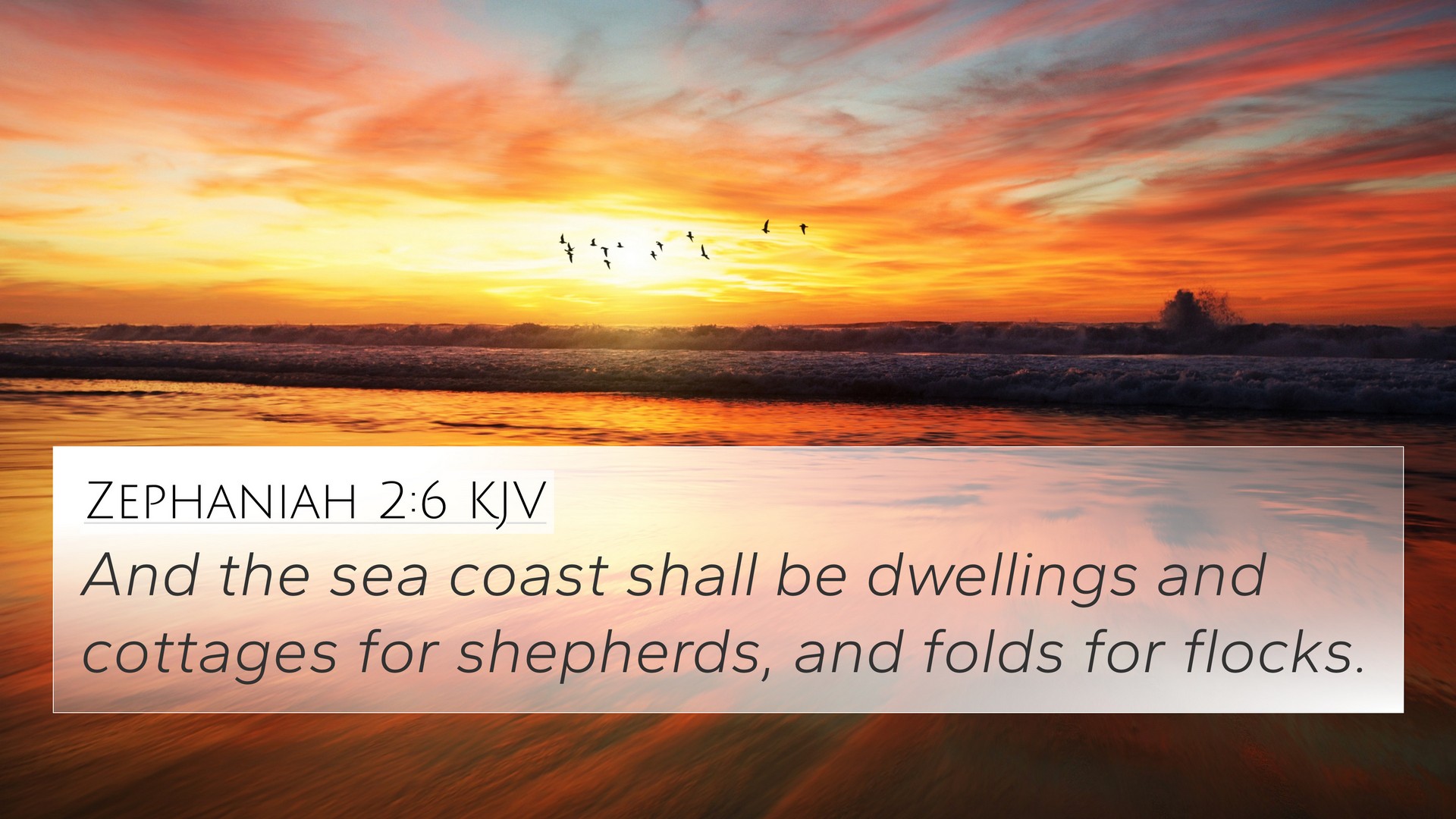Old Testament
Genesis Exodus Leviticus Numbers Deuteronomy Joshua Judges Ruth 1 Samuel 2 Samuel 1 Kings 2 Kings 1 Chronicles 2 Chronicles Ezra Nehemiah Esther Job Psalms Proverbs Ecclesiastes Song of Solomon Isaiah Jeremiah Lamentations Ezekiel Daniel Hosea Joel Amos Obadiah Jonah Micah Nahum Habakkuk Zephaniah Haggai Zechariah MalachiZephaniah 2:6 Similar Verses
Zephaniah 2:6 Cross References
And the sea coast shall be dwellings and cottages for shepherds, and folds for flocks.
Uncover the Rich Themes and Topics of This Bible Verse
Listed below are the Bible themes associated with Zephaniah 2:6. We invite you to explore each theme to gain deeper insights into the Scriptures.
Zephaniah 2:6 Cross Reference Verses
This section features a detailed cross-reference designed to enrich your understanding of the Scriptures. Below, you will find carefully selected verses that echo the themes and teachings related to Zephaniah 2:6 KJV. Click on any image to explore detailed analyses of related Bible verses and uncover deeper theological insights.
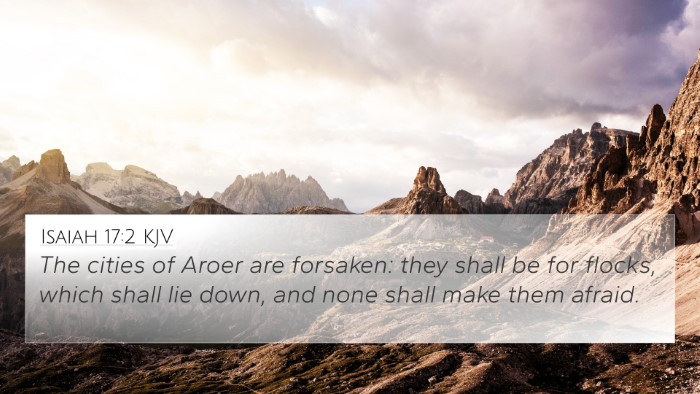
Isaiah 17:2 (KJV) »
The cities of Aroer are forsaken: they shall be for flocks, which shall lie down, and none shall make them afraid.
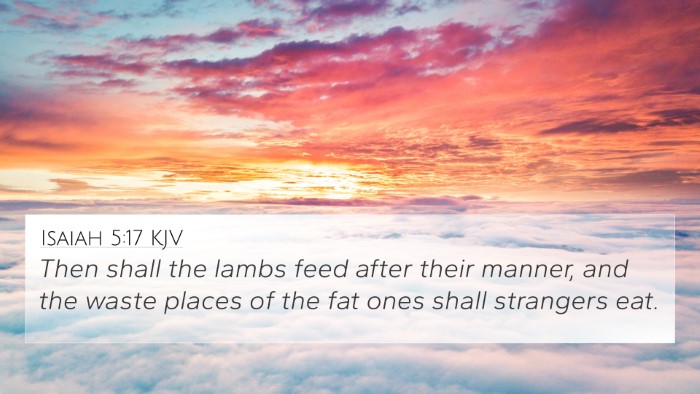
Isaiah 5:17 (KJV) »
Then shall the lambs feed after their manner, and the waste places of the fat ones shall strangers eat.
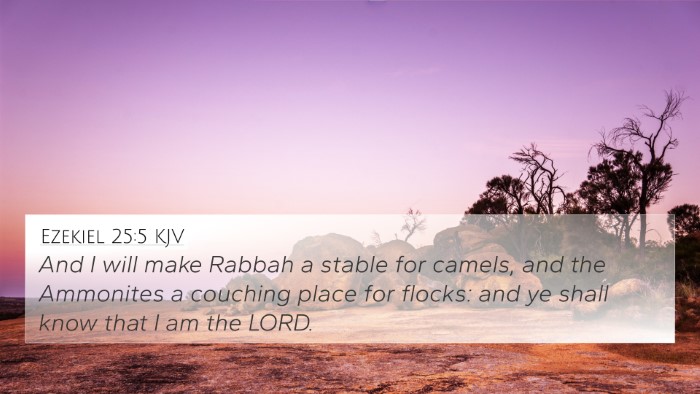
Ezekiel 25:5 (KJV) »
And I will make Rabbah a stable for camels, and the Ammonites a couching place for flocks: and ye shall know that I am the LORD.
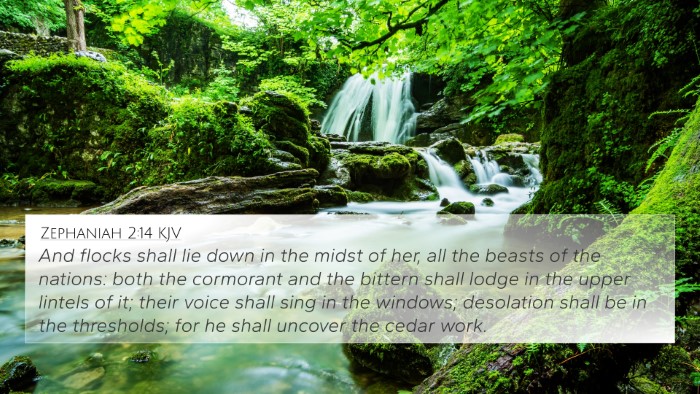
Zephaniah 2:14 (KJV) »
And flocks shall lie down in the midst of her, all the beasts of the nations: both the cormorant and the bittern shall lodge in the upper lintels of it; their voice shall sing in the windows; desolation shall be in the thresholds; for he shall uncover the cedar work.
Zephaniah 2:6 Verse Analysis and Similar Verses
Understanding Zephaniah 2:6
Zephaniah 2:6 reads: "And the sea coast shall be dwellings and cottages for shepherds and folds for flocks." This verse is part of a prophetic message concerning the fate of various nations, particularly the Philistines, and it reveals God’s plan for restoration and judgment.
Context and Background
The Book of Zephaniah is considered one of the minor prophetic books in the Old Testament, addressing the impending judgment from God due to the sins of Judah and its surrounding nations. Zephaniah prophesies during the reign of King Josiah, a time of both religious reform and impending doom.
- God's judgment on Judah and the nations surrounding Israel.
- The call to repentance and recognition of God's sovereignty.
- Hope for restoration following a period of judgment.
Interpretation from Public Domain Commentaries
Matthew Henry's Commentary:
Henry interprets this verse as a promise of restoration for the land that once belonged to the Philistines. The transformation of the sea coast into “dwellings and cottages for shepherds” indicates a return to pastoral life, where the land will be fruitful again. It also reflects the idea that the enemies of God's people will be reduced to a state of desolation, demonstrating God's control over the nations.
Albert Barnes' Notes:
Barnes emphasizes that the future of the land will involve a significant change from the previous dominion of the Philistines to a peaceful state inhabited by shepherds and their flocks. The imagery used signifies peace and possession, contrasting the past turmoil of conflict and strife. The mention of shepherds reflects not only the physical but also the spiritual care that God provides.
Adam Clarke's Commentary:
Clarke notes that this prophecy draws attention to the profound change that God will enact in the futures of the surrounding nations. The coastal regions will no longer be a land of violence and corruption but will become a place suitable for simple pastoral life. This shift indicates God’s mercy and His plan for restoration amid judgment.
Bible Cross-References
Zephaniah 2:6 can be connected with several other biblical passages that explore similar themes of judgment, restoration, and peace:
- Jeremiah 47:4: A prophecy concerning the Philistines affirms God’s judgment against them.
- Isaiah 14:29: Speaks on the demise of the Philistines and looks forward to a future without their threat.
- Ezekiel 25:16-17: Prophecies against the Philistines that echo similar themes of desolation and eventual downfall.
- Psalms 72:9: Emphasizes peace over conflict in reference to God's reign.
- Micah 4:6-7: A promise of restoration for the people of God and the transformation of abandoned places.
- Isaiah 65:17: Speaks of the new heavens and the new earth, showcasing God’s restorative power.
- Matthew 10:16: A reflection on God’s guidance for His people in a hostile environment, aligning with the pastoral metaphor.
Connections Between Bible Verses
This verse is linked not only to the surrounding text within Zephaniah but also embodies overarching biblical themes of redemption and restoration. The connections between Bible verses highlight God's continuous narrative of judgment followed by grace, evident throughout both the Old and New Testaments.
How to Use Bible Cross-References
Understanding and utilizing Bible cross-references can enhance your study and comprehension of scripture. Here are a few methods:
- Use a Bible Concordance: A concordance can help locate verses and their interconnections based on keywords.
- Employ a Cross-Reference Bible: Editions with cross-referencing guides provide immediate connections within the text.
- Study Thematically: Group verses by themes such as judgment, restoration, and peace to uncover deeper insights.
- Keep Notes: Document personal insights or connections that emerge as you study.
Conclusion
Zephaniah 2:6 serves as a reminder of God's sovereignty over nations and a promise of peace for His people. By exploring this verse through public domain commentaries, we can draw rich insights and make meaningful connections through cross-referencing other Biblical texts. Understanding how these connections work helps us to grasp the broader narrative of scripture, showcasing God's enduring love, judgment, and restoration.
